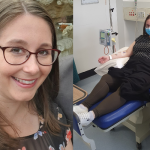- Part of Australia’s response to COVID-19 included the rapid implementation of telehealth via telephone or video, publicly funded by Medicare and the Medical Benefits Scheme.
- Researchers at ANU interviewed people living with MS accessing telehealth consultations, to ask them about their experiences and highlight important factors for healthcare professionals to consider when using the telehealth platform as part of their care.
- By understanding how the COVID-19 pandemic and the need for telehealth impacts people with MS, the MS healthcare team can adjust their model of care, which may have long-lasting positive effects on how MS care is delivered, both during and after the pandemic.
People living with MS need complex care and often engage with a variety of healthcare professionals to manage their health and well-being. The COVID-19 pandemic brought specific challenges for people living with MS in accessing their usual care and treatments. These concepts were explored in this qualitative research study.
The ANU study team and their unique MS connections
Dr Anne Parkinson and Dr Jane Desborough, together with their team from the Australian National University (ANU) and in partnership with the Our Health In Our Hands (OHIOH) project explored the experiences of people living with MS in accessing healthcare, including via telehealth, during the COVID-19 pandemic in Australia. Members of the OHIOH team have previously received funding from MS Research Australia for research into the development of an online toolkit for collaborative MS research. What is different about this study team is that half of the team comprises of people living with MS, which provides a unique insight into the research question, with all team members involved in the research development. A diverse group of people living with MS were interviewed during the study about various types of healthcare consultations (for example, with general practitioners, physiotherapists, specialists and psychologists). During the pandemic, usual healthcare was often not sought, with many people living with MS feeling vulnerable to becoming infected with the COVID-19 virus.
What did the study findings reveal?
Published in Health Expectations, the findings revealed that telehealth has been a valuable tool in managing both MS and general health, providing improved access, convenience, and a contact-free consultation. During the pandemic, the contact-free option added a degree of protection, for people living with MS who felt vulnerable to potential exposure to the COVID-19 virus. Additionally, fatigue and transport issues were greatly relieved by avoiding long trips, often complicated by tiredness from exertion, unpredictable waiting times and parking concerns. Researchers noted that people living with MS found that video telehealth was more personal than phone telehealth, as they were able to feel more personal connection over video, with the added benefit of a modified physical examination with their healthcare practitioner, which is important in assessing symptoms of MS.
When people living with MS thought about the option of a face-to-face consultation during the pandemic, researchers developed three key themes of consideration, revealing the issues most important to them throughout this time. Firstly, assessing their personal risk from immune suppression due to MS medications. This also included other risk factors such as the risk of falls when attending the visit and worsening fatigue. Secondly, the concept of postponing their usual care, including putting off mental health appointments, infusions, and MRIs to avoid contact with others to protect themselves. Thirdly, accessing new ways of care including telehealth as a safe and contactless option, which also proved to be more convenient and better for fatigue levels. This created a new way for people living with MS to look after themselves safely, while receiving the care and guidance they needed.
What can we learn from this study to better help people living with MS?
These themes give healthcare practitioners important insights into the factors to consider for people living with MS when planning their care and appointments, while considering what is most important to them. Whilst telehealth could not replace face-to-face care, especially when performing intricate physical examinations, there is still a place for telehealth in MS clinical care, offering a safe and contact-free option when appropriate. Researchers also noted that telehealth was perhaps better suited to already established relationships with healthcare practitioners, where people with MS have already developed trust and confidence with their healthcare practitioners. The study also found that there are some knowledge and capacity gaps for healthcare practitioners when conducting telehealth and that they may benefit from education, to help them communicate effectively using this platform with their patients and clients. This study shows that careful planning and appropriate use of telehealth has a place in future care for people living with MS, beyond the COVID-19 pandemic.




